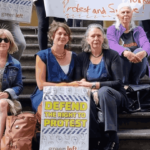The Decades Long War on Climate Defenders in the Global South Creeps North

Global Witness published its Decade of Defiance report in September, outlining that since 2012, one land and environmental defender has been killed on average every two days somewhere around the planet.
Indeed, since the Paris Agreement was adopted in 2015, 1,213 climate defenders protesting the detrimental actions of the extractive industry have been killed, most of them in the Global South, while its corporations in the Global North that are reaping the benefits of these acts of violence.
This blatant disregard for human life and accompanying opposition to those trying to prevent the destruction of the liveable earth, however, is beginning to take hold in countries of the Global North, including Australia, where increasingly the liberty of climate activists is under attack.
And even though the rising trend of locking up climate defenders in wealthier nations isn’t as unashamedly rights-denying as the punishment that globalised capitalism metes out to such defenders in low-income countries, their human rights are being encroached upon, nonetheless.
Decades of murder
Indian environmental activist Dr Vandana Shiva explains in the forward to Decade of Defiance that, as was the case in 2021, about 200 climate activists are killed across the globe each year, or three every week, and these murders have been going on for decades.
Shiva explains that climate defenders are fighting a viewpoint that originated in the West, and is rooted in 19th century industrial revolutions, which considers nature something to be conquered, and those in the Global South being murdered for opposing this project, gain few benefits from it.
“The final, saddest truth is that this viewpoint has brought us to the brink of collapse,” the environmentalist continues, adding that the resulting deaths should be opposed, and protections rolled out not just on “basic moral” grounds, but to further protect species and planet.
Global Witness reported last week that a February 2022 IPCC report warns that “any further delay in concerted anticipatory global action… will miss a brief and rapidly closing window of opportunity to secure a liveable and sustainable future for all”.
But in the Global South, authorities are literally shooting the messenger. And the ongoing murder of climate defenders is a crisis that’s disproportionately affecting Indigenous peoples, as while making up 5 percent of the global population, they account for 40 percent of the victims of these attacks.
Domestic Terrorism
Meanwhile, over in the United States, climate defenders are now being arrested on domestic terrorism charges.
On a recent episode of The Final Straw Radio podcast, the presenter spoke with Sarah, from the Atlanta Anti-Repression Committee, about the recent police raids in the Welaunee Forest, which saw six climate defenders charged as domestic terrorists for building tree houses and throwing stones.
Since May 2021, there has been an ongoing land defence action within the Welaunee or South River Forest to prevent the construction of the world’s largest movie sound studio, as well as a huge police training centre.
“These projects… are threatening a huge, much beloved section of urban forest,” explained Sarah, adding that part of the demonstration has involved a long-term encampment in the forest to prevent development activities, which has involved controversial tree sits.
On 13 December, the Atalanta police conducted yet another raid upon the forest activists. Yet, this time, officers targeted those sitting in the trees, threatening them with violence and then firing tear gas and pepper balls at the treehouses.
Sarah stressed that the laying of domestic terrorism charges marked the first time 2017 laws have been applied. And this escalation, according to the activist, “is a scare tactic to implement a chilling effect across the movement”, as it turns climate defenders into enemies of the US state.
Targeting serial protests
The UK House of Lords is currently deliberating upon the Public Order Bill 2022, which, if passed, creates a series of laws designed to crack down on climate defenders partaking in unauthorised peaceful but disruptive direct actions. An approach that’s currently being rolled out in Australia.
A UK government factsheet outlines that these laws are designed to combat the new breed of climate protesters, who are willing to use guerrilla tactics to raise awareness to the climate crisis. And as in Australia, these actions now consist of small groups putting their own liberty on the line.
If successful, the bill will see locking-on at a protest punishable by 6 months imprisonment and an unlimited fine, while obstructing major transport works triggers the same penalties, and interfering with key national infrastructure can see a defendant facing 12 months inside.
Police stop, search and seizure powers are to be bolstered, so that those suspected to be in possession of equipment likely to be used in a protest-related offence can be searched and items, like lock-on devices, can be confiscated.
And the UK is also contemplating a system of serious disruption prevention orders, which would permit police to place a convicted activist, or even an individual who’s merely participated in a protest, under an order that prevents further demonstrating and can limit movements.
The war down under
The Perrottet government passed laws in early April that see protesters in NSW who partake in unauthorised nonviolent direct actions that block a bridge, tunnel, road or major facility facing up to 2 years inside and/or a $22,000 fine.
These laws were rolled out to specifically target climate defenders, who, as in the UK, are escalating their tactics in taking action, as they recognise that governments aren’t seriously acting to curb rising extreme weather events, which are starting to become routine occurrences.
Taken together with the laws being enacted to prevent climate protests in other Global North countries, it’s clear that governments are committed to stamping out those warning of the mounting crisis in order to protect the profits and ongoing existence of the fossil fuel industry.
In August, similar laws were passed in Victoria and Tasmania, which target those protecting the environment, including against logging, with draconian prison penalties involved. These laws follow a general trend of legislating against climate activists that began in Queensland in 2019.
Prior to Perrottet’s new anti-protest regime being applied on the ground, a string of extreme custodial sentences were already being imposed upon climate defenders in NSW, which, while overturned on appeal, saw activists punished with at least some time spent in the lockup.
While climate defender Violet Coco became the first individual to be sentenced under the new NSW protest laws on 2 December, when she received a 15 month sentence, with non-parole set at 8 months. Although she was released on bail a week later.
And as with elsewhere in the country, these excessive laws now applied to Coco, saw various groups within the climate and the union movements join together to unite against the common enemy of the overbearing ban on unauthorised nonviolent demonstration in this state.
However, the general global shift towards stamping out climate defenders in the Global South and the move to label them domestic terrorists in the United States loom heavily over what’s set to take place in regard to climate actions moving into the future on this continent.







